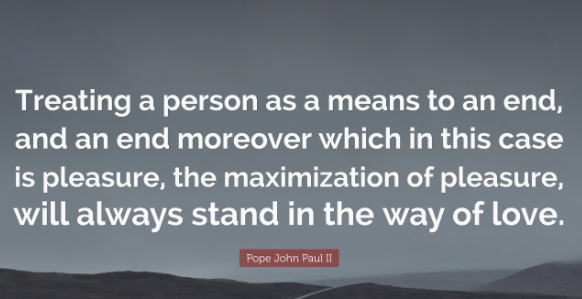Liberalism has an extremely transactional approach to human relationships. By this I mean that a relationship lasts only as long as we get a net benefit from it over time. We treat others as a means to an end, ultimately speaking. This nullifies the idea of self-sacrificial love, and therefore of love itself in the proper sense.
You might deny social liberalism does this. You might say that it encourages us to love each other just as much as other philosophies like Christianity do. But I think the evidence shows otherwise. Christianity says there may come a point where we have to sacrifice our personal happiness for the sake of someone else, even someone who does not love us back. Liberalism, whose chief goal is the maximising of personal happiness, ultimately finds this abhorrent. Hence it has no real difficulty with high rates of divorce, abortion, abandonment of children by their fathers, and, as we increasingly see, euthanasia. If something gets in the way of our personal happiness, then we are allowed to rid ourselves of it.
The New York Times has an ‘ethicist columnist’. People write to him with ethical dilemmas. A woman recently wrote to the columnist to tell him that she believes her husband is succumbing to dementia and wonders whether it would be alright to leave him in due course.
She says: “I’m not thrilled about spending my retirement years as a caregiver. It’s a huge sacrifice that will narrow my own life significantly. Do we both need to go down with the ship? Can I leave now (and let his family deal with this)? Or am I obligated to stay and care for him?”
To cut to the chase, the advice she is given, is ‘maybe not’. The columnist advises her to find ways reducing the care burden if she does stay with him, but he does not by any means rule out the option of leaving him.
He says: “I’m not saying that you’re required to sacrifice your well-being to his. The special obligations we have to our loved ones are rooted in the value we place on our relationships with them, with all the resilience, and fragility, of those relationships.”
In other words, if you no longer value that relationship, if you are no longer getting from it what you thought you would, then it is ok to cut and run.
A Christian would give totally different advice. According to the age-old Christian understanding, when you marry, you agree to stick together. “For better, for worse, for richer, for poorer, in sickness and in health”. The columnist acknowledges this old view of marriage in passing, but then weakens it as we have seen. You don’t really have to stick around if your spouse becomes very sick. The ethical obligation is not that strong. You don’t really have to sacrifice your happiness if it comes down to it.
Nothing could express more fully and clearly how social liberalism gives us the green light to sacrifice almost anything or anyone to our personal happiness. It could scarcely be more different from Christianity in this regard.
But in the end, it is totally self-defeating, even on its own terms. You might think it is ok to turn your back on someone if they become very burdensome. But what happens if one day you are that burden? You can hardly complain if you are the one who ends up abandoned. If you live by the sword, you must be prepared to die by it.
















